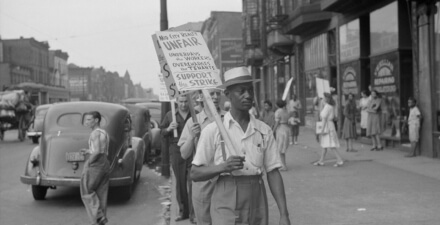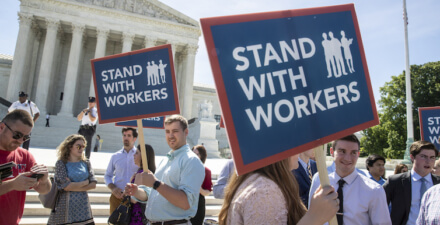Labor in the Boardroom: A Model for the United States?

Under U.S. law, corporate boards of directors represent the interests of companies’ shareholders. This is reflected in the typical composition of boards, composed almost entirely of people from the business world, with some from the nonprofit sector and other elements of the private sector mixed in. Because boards of directors oversee the management of companies, they have fiduciary responsibilities to look at corporate strategy, hiring, and other decision-making through the lens of how these corporate activities affect the interests of the corporation, which, in recent decades, generally means the shareholders.
One group that boards do not look out for are the workers whose labor creates value for companies. Workers matter to boards only as they affect shareholder interests. That is not to say that boards don’t care at all about the health, safety, and well-being of workers. For one thing, they are obliged to follow the state and federal laws affecting workers. But generally, their interest in workers—how many there are, what they are paid, how they are treated—is confined to how such decisions affect shareholder interests, such as stock prices and fulfilling firms’ legal responsibility for workplace protections and rights.
It does not have to be this way. Building an economy with broadly shared growth can include corporate policy that considers a broader range of interests, including the voices of the workers, who make companies operate day-to-day, in decisions about both short- and long-term priorities. It’s possible that federal law can be changed, as it has been in more than a dozen European countries, to require corporate boards to represent the interests of workers, as well as shareholders.
How would this affect companies and workers? New research on Germany, funded by the Washington Center for Equitable Growth, by grantees Simon Jäger of the Massachusetts Institute of Technology and Benjamin Schoefer of the University of California, Berkeley, along with Jörg Heining of the German Institute for Employment Research, seeks to answer these questions. The co-authors examine how changes to so-called co-determination laws (corporate governance speak for worker participation at the board level) affected employment and earnings. Despite predictions by business interests that giving workers more voice may run contrary to sustainable corporate strategy, the three researchers find that companies with co-determination perform well, do not have any significant changes to wage levels, and are less likely to outsource business functions.
Policies such as co-determination are increasingly relevant to the United States, where wages have remained essentially stagnant for decades, despite a long-term increase in productivity, which suggests that workers are creating value but are not reaping any of its benefits. As the U.S. labor market becomes increasingly fissured, with rising domestic outsourcing over time, workers find fewer opportunities for advancement, and declining unionization rates decrease workers’ voices. Furthermore, wage stagnation was largely resistant to more than a decade of economic recovery and a historic drop in unemployment until the recent coronavirus recession.
As U.S. policymakers consider how to address this problem, serious thought is being given to how corporate structures might be changed to take workers’ interests into greater account—on the assumption that this could help workers get a larger share of the corporate pie. Clean Slate for Worker Power, a project of Harvard Law School’s Labor and Worklife Program, is advancing an agenda of U.S. labor law reforms designed to restore worker power, including requiring worker representation on corporate boards. And legislation is before Congress to establish such a requirement.
To help policymakers understand these proposals, it would be helpful to know what effect such reforms might have on wages and employment, as well as investment and capital stock, corporate profits, and the long-term success of individual businesses. Research by Jäger, Schoefer, and Heining begins to answer these questions.
It might be difficult for people in our nation to think of corporate boards representing anybody but shareholders since this is part of American corporate culture and precedent going back to the 1970s. In fact, boards are very different in some countries. A case in point is Germany, where, for nearly 70 years, the law required workers to be represented on some corporate boards. While that mandate existed in some form going back to 1951, it was abruptly abolished in 1994 for new firms. But the mandate remained, and remains, for firms that existed before that date.
This sudden change in German law created a so-called quasi-experiment that allowed Jäger, Schoefer, and Heining to examine how labor representation in corporate governance affects workers and companies. Operating side-by-side in Germany are companies still under the mandate and companies free of it. This raises numerous questions. How do they compare? Does having workers on the board result in higher wages? Lower capital stock? Reduced profits? More bankruptcies? That is what conventional economic theory might suggest. The researchers’ working paper, “Labor in the Boardroom,” examines these questions, with some very interesting conclusions.
First, some background. Like many other European countries, Germany has a two-tier board system, a supervisory board and an executive board. The executive board is equivalent to the senior management of a U.S. company, with day-to-day operational responsibilities. The supervisory board operates much like U.S. boards of directors, with responsibility for the selection, monitoring, auditing, compensation structuring, and dismissal of the executive board. It is involved in strategic planning, large financial decisions, and other fundamental decisions about the company.
Between 1951 and 1976, Germany passed a series of laws that mandated supervisory boards of companies—other than privately held firms or limited liability corporations—be made up of varying levels of workers’ representatives, depending on the size and type of company. By 1976, the largest corporations and smaller companies in the mining, coal, and steel industries were required to have workers’ representatives comprising one-half of their supervisory board membership. Other companies had one-third worker representation. Workers elected their own representatives, who were always workers, except in the largest companies, where workers were permitted to elect outsiders to supplement workers.
In the United States, one might expect co-determinant boards to be contentious, but in practice, in Germany, when worker and shareholder representatives hold equal or near-equal power, they tend to operate by consensus. One reason might be the existence of works councils, which have extensive consultation, information, and co-determination rights in areas such as work hours, safety, and organizational or staffing changes, and can directly negotiate with the employer. Works councils do not exist in the United States, but they have a purview similar to that of labor unions in the United States, except that they participate in setting principles of wage setting rather than engaging in direct negotiations over wage levels, as U.S. unions do.
Only roughly 9 percent of workplaces in Germany have works councils, but they are overrepresented at larger workplaces. This means they cover 42 percent of employees in the former West Germany and 35 percent in the former East Germany. In part as a result of these structural differences, with works councils present at many larger businesses, there tends to be, in general, greater cooperation between labor and management in Germany.
In 1994, all this changed abruptly. The German federal parliament, the Bundestag, passed legislation exempting all new corporations from the worker representation mandate while maintaining it for existing companies. The rationale for treating old and new companies differently was that existing companies had already become accustomed to shared governance. Researchers Jäger, Schoefer, and Heining, however, say this was a legislative compromise between those who wanted to retain the status quo and those who wanted to abolish the mandate entirely. (The new law made no changes in works councils.)
To understand the effect of this change and to estimate the impact of co-determination on company and worker outcomes, Jäger, Schoefer, and Heining measured a number of metrics for companies incorporated 2 years before and 2 years following the change in law. This creates a sample of companies created under more or less similar economic conditions and average productivity levels, but incorporated under different legal frameworks. Thus, all the firms were incorporated between August 10, 1992 and August 10, 1996. Those incorporated before August 10, 1994 were subject to the mandate; those incorporated after that date were not.
To ensure the robustness of their findings, the researchers tested a number of factors to ensure that nothing about that particular time period distorted the results. So, they also compared these firms with publicly held companies that were subject to the mandate and then released from it in 1994, and with limited liability corporations, which were never subject to the mandate. This helped to ensure that any changes post-1994 were not due to overall changes in the economy or other outside factors affecting business more generally. Jäger, Schoefer, and Heining did additional testing of other potential factors as well to ensure that changes were likely due to the boardroom legislation and not other issues.
It’s also important to note that the legislative compromise was unanticipated, and that it was implemented literally the day after it was both announced and enacted. So, there was no gap in incorporations just prior to the change in the law, which might have suggested deliberate avoidance of the mandate. And there was no rush to incorporate immediately following it, which might have suggested the same.
Generally, Jäger, Schoefer, and Heining found no significant impact on overall wages or employment. In fact, they found a slight increase in capital assets and significant upward movement in capital share, not labor share, due primarily to an increase in worker productivity. In other words, under shared governance, the same number of workers being paid essentially the same amount produce more value per worker, and that value is accruing to capital, not labor.
There does appear to be a significant reduction in outsourcing as a result of co-determination. Outsourcing is credited with decreasing average labor standards and worker outcomes across an economy. But for firms and their shareholders, the bottom line is that there is a slight increase in capital assets, and neither revenues nor profits appear to be significantly affected.
This also suggests that giving workers a voice in corporate decision-making does not lead to deleterious outcomes, such as bankruptcy, due to workers’ potential differing priorities. Important, too, is that corporate policy doesn’t affect only shareholders’ bottom lines. Companies also employ the workers and provide goods and services to the consumers who are both the bedrock of our economy.
Research like this can only speculate as to the reasons for these results and how they might differ if shared governance on corporate boards were adopted in the United States. Shared governance has existed in Germany for nearly seven decades, so the management and workers of firms that remained under the pre-1994 mandate had essentially known nothing different. Results could be different if new corporate governance rules were enacted for U.S. companies unused to shared governance.
More research could give policymakers, workers, and corporate leaders alike a stronger basis for projecting possible outcomes. But this new research by Jäger, Schoefer, and Heining does suggest that workers being given a greater voice in the workplace does not lead to the negative economic outcomes purported by anti-labor critics, such as unsustainable levels of pay or workers embracing luddite-like resistance to technological change.
Their findings also might reflect the more cooperative labor relations that are prevalent in Germany, although it may be that those cooperative relations are partly a result of shared governance. The consensus nature of supervisory boards in Germany suggests that shared governance—over the long run—can produce good results for workers, companies, and the economy. Here in the United States, researchers could look at the experiences of worker-owned companies or companies with significant employee stock ownership plans (so workers are essentially shareholders) to see whether parallels with the German experience are germane.






